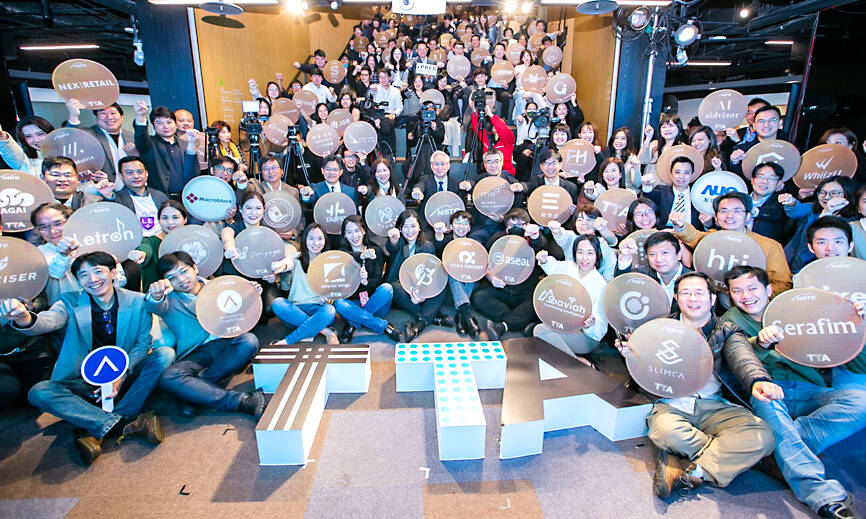The National Science and Technology Council is to lead 96 Taiwanese tech start-ups to the annual Consumer Electronics Show (CES) in Las Vegas, Nevada, from Jan. 7 to 9, the council said yesterday.
It would be Taiwan’s seventh participation at CES as a national team, the council said, adding that it hopes to showcase the nation’s technological strength.
About 28 percent of the group comprise start-ups focusing on research and innovation in artificial intelligence (AI) and robotics, while 20 percent specialize in digital health and 18 percent are devoted to smart cities and sustainability, the council said in a statement following a news conference in Taipei.

Photo courtesy of the National Science and Technology Council
Other start-ups are to display their innovations and technologies related to smart homes, sports and fitness, as well as vehicles and advanced mobility during the CES event, the council said.
In addition, two start-ups from the Taiwan Tech Arena start-up development center have won CES 2024 Innovation Awards, with FaceHeart Corp (鉅怡智慧) earning plaudits for its US Food and Drug Administration-certified video-based health measurement software and TSGC Technologies Inc (鴻躉) getting recognition for its eco-friendly and economical recycling solution for solar panels, it added.
The Taiwan Tech Arena is a platform launched by the Cabinet in 2018 to cultivate tech start-ups by helping them raise funds and engage with local entrepreneurs as well as US and European business incubators. The start-up development center at the Taipei Arena aims to cultivate at least 100 start-ups annually, mainly focused on AI, Internet of Things and software applications.
The council is also to host an international conference — dubbed Semiconductors, Global Trends and Taiwan — on Jan. 8 during the CES expo, with well-known experts and academics in the semiconductor field invited to exchange opinions and foster collaboration, it said.
The council said it would also introduce what it calls the Taiwan Chip-based Industrial Innovation Program (晶片驅動台灣產業創新方案) to participants during the seminar, as the program is crucial to the nation’s technological strength over the next 10 to 20 years and Taiwan aims to be a reliable partner in the global supply chain of the semiconductor industry.
The government has planned to allocate NT$300 billion (US$9.72 billion) for the program’s implementation over the next 10 years, the council said earlier.

MULTIFACETED: A task force has analyzed possible scenarios and created responses to assist domestic industries in dealing with US tariffs, the economics minister said The Executive Yuan is tomorrow to announce countermeasures to US President Donald Trump’s planned reciprocal tariffs, although the details of the plan would not be made public until Monday next week, Minister of Economic Affairs J.W. Kuo (郭智輝) said yesterday. The Cabinet established an economic and trade task force in November last year to deal with US trade and tariff related issues, Kuo told reporters outside the legislature in Taipei. The task force has been analyzing and evaluating all kinds of scenarios to identify suitable responses and determine how best to assist domestic industries in managing the effects of Trump’s tariffs, he

TIGHT-LIPPED: UMC said it had no merger plans at the moment, after Nikkei Asia reported that the firm and GlobalFoundries were considering restarting merger talks United Microelectronics Corp (UMC, 聯電), the world’s No. 4 contract chipmaker, yesterday launched a new US$5 billion 12-inch chip factory in Singapore as part of its latest effort to diversify its manufacturing footprint amid growing geopolitical risks. The new factory, adjacent to UMC’s existing Singapore fab in the Pasir Res Wafer Fab Park, is scheduled to enter volume production next year, utilizing mature 22-nanometer and 28-nanometer process technologies, UMC said in a statement. The company plans to invest US$5 billion during the first phase of the new fab, which would have an installed capacity of 30,000 12-inch wafers per month, it said. The

Taiwan’s official purchasing managers’ index (PMI) last month rose 0.2 percentage points to 54.2, in a second consecutive month of expansion, thanks to front-loading demand intended to avoid potential US tariff hikes, the Chung-Hua Institution for Economic Research (CIER, 中華經濟研究院) said yesterday. While short-term demand appeared robust, uncertainties rose due to US President Donald Trump’s unpredictable trade policy, CIER president Lien Hsien-ming (連賢明) told a news conference in Taipei. Taiwan’s economy this year would be characterized by high-level fluctuations and the volatility would be wilder than most expect, Lien said Demand for electronics, particularly semiconductors, continues to benefit from US technology giants’ effort

‘SWASTICAR’: Tesla CEO Elon Musk’s close association with Donald Trump has prompted opponents to brand him a ‘Nazi’ and resulted in a dramatic drop in sales Demonstrators descended on Tesla Inc dealerships across the US, and in Europe and Canada on Saturday to protest company chief Elon Musk, who has amassed extraordinary power as a top adviser to US President Donald Trump. Waving signs with messages such as “Musk is stealing our money” and “Reclaim our country,” the protests largely took place peacefully following fiery episodes of vandalism on Tesla vehicles, dealerships and other facilities in recent weeks that US officials have denounced as terrorism. Hundreds rallied on Saturday outside the Tesla dealership in Manhattan. Some blasted Musk, the world’s richest man, while others demanded the shuttering of his